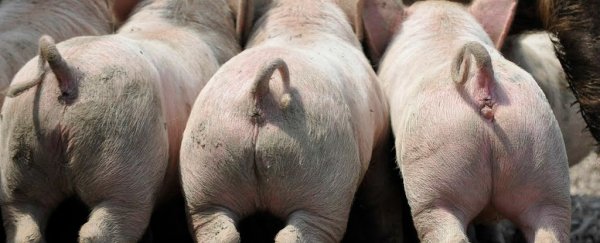If you ever stay awake at night worrying about how humans are overusing antibiotics, the agricultural industry is your worst nightmare. Over half the antibiotics used in the US goes directly into food for animal production, and although this means the animals get plumper and don't get sick as often, it also means that antibiotic resistance can accumulate and spread at a faster rate.
Fortunately, researchers from the University of Technology Sydney (UTS) - and some pigs - are on the case, investigating how their gut bacteria respond to antibiotics and probiotics. "This project will allow us to understand how antibiotic resistance develops and how it moves within complex microbial communities - in other words, to understand the behaviour of gut flora," said Steven Djordjevic, lead researcher and professor of infectious diseases at UTS's ithree Institute.
Gut flora has been linked to everything from which diet will work for you to easing anxiety and depression, so it's no real surprise that it's important in farming too.
Currently, most research into antibiotic resistance is focused on nursing and hospital environments, and while this is exceptionally important, there's also a need for research into antibiotic use in animal production. Not only will more responsible antibiotic use be good for the animals, research has shown that they can pass resistant E. coli and other bacteria onto us, so it's in our best interest to address the issue.
"More antibiotics are used for agricultural purposes - for the treatment of infections, growth promotion and to prevent the spread of disease - than in human health care." Djordjevic said. "The project will also provide new baseline knowledge of what constitutes healthy porcine gastrointestinal tract flora and how that flora is affected by antibiotic and probiotic formulations."
According to the UN Food and Agriculture Organisation, pork is the most widely consumed meat in the world, followed by poultry and beef. Pork production in China alone generates an impressive 600 million tonnes of swine manure annually. Because the manure is contaminated with antibiotics and resistant bacteria, when the waste is used to fertilise crops, the bacteria and antibiotics make their way into our food chain.
The world is undeniably a better place since the introduction of antibiotics - you're no longer at risk of dying from a rose thorn scratch, and bacterial pneumonia is no longer a death sentence. But, our overuse of antibiotics has led to an increase in antibiotic resistant bacteria. There are even microbes that have shown to be resistant to our last line of antibacterial defence, polymyxins. These resistant bacteria were discovered in pigs – just one of the reasons this research is so important.
"We will investigate how microbial populations in the guts of pigs respond to various challenges, including an assault by an antibiotic and two different probiotic formulations," Djordjevic said. "We will characterise the potential threat porcine E. coli pose for human health by identifying the virulence genes and the mobile antibiotic resistant genetic elements they carry."
Although the research will only be focusing on E. coli, the implications could be used to fight other forms of resistant bacteria, reduce the spread, and will hopefully lead to healthier livestock and humans.
UTS Science is a sponsor of ScienceAlert. Find out more about their research.
